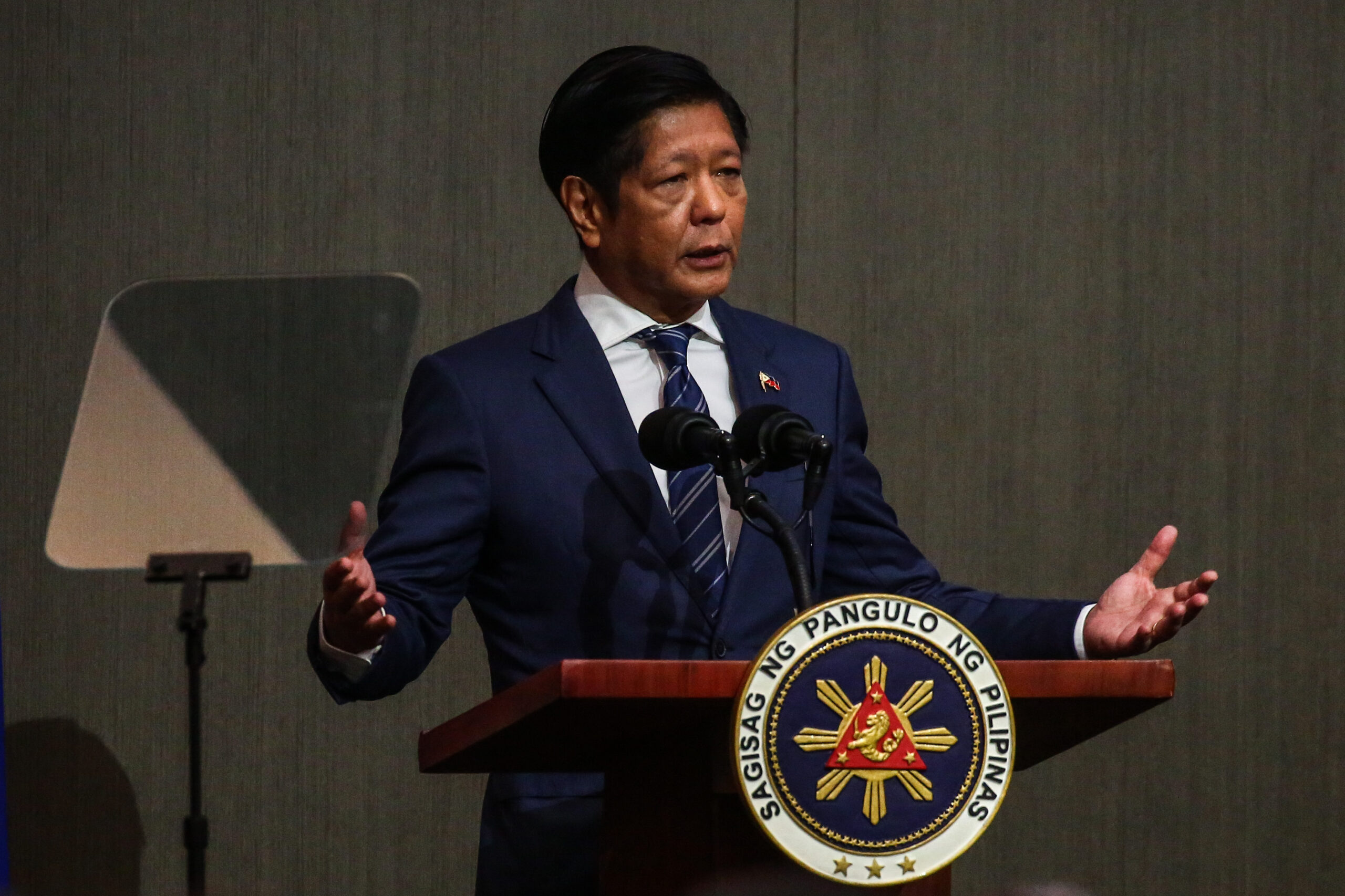MELBOURNE—President Ferdinand Marcos Jr. said the Philippines would continue to engage China on mutual interests but would “push back” if the Philippines’ sovereignty over the West Philippine Sea (WPS) would be “questioned or ignored.”
He called out the “pattern of aggression” in the West Philippine Sea despite the country’s 2016 victory in its arbitral case against China, based on the United Nations Convention on the Law of the Sea (Unclos).
Speaking before Australian policy think tank Lowy Institute at the iconic State Library Victoria here on Monday night, Mr. Marcos rejected the notion that maritime disputes in the South China Sea are an extension of the contest between the United States and China.
Such a narrative “distracts us from calling out aggressive, unilateral, illegal and unlawful actions” that violate international law and the charter of the United Nations, the President said.
READ: Marcos finds China actions in West Philippine Sea getting worrisome
He called the Philippines’ alliance with the United States “a pillar of regional stability for decades,” but also cited “centuries of friendship and kinship” between the Filipino and Chinese peoples.
“Our independent foreign policy compels us to cooperate with them (China) on matters where our interests align, to respectfully disagree on areas where our views differ, and to push back when our sworn principles, such as our sovereignty, sovereign rights, and our jurisdiction in the West Philippine Sea are questioned or ignored,” the President said.
‘Primordial duty’
Mr. Marcos said defending the territory of the Republic was not a policy choice but his “primordial duty” as the country’s leader.
“So we will do whatever it takes to maintain that security. That’s the situation wherein it is very, very clear that the territorial integrity of the Philippines cannot be threatened. And if threats are made, then we must defend against those threats,” he said.
He reiterated the Philippines’ commitment to the peaceful settlement of disputes, but said: “We shall never surrender even a square inch of our territory and our maritime jurisdiction. In this regard, we are upgrading the capabilities of our Coast Guard and pursuing the modernization of our Armed Forces.”
“Our forces must be able to guarantee to the fullest extent possible, Filipino nationals, Philippine corporations, and those authorized by the Philippine government, unimpeded and peaceful exploration and exploitation of all natural resources in areas where we have jurisdiction, including and especially our exclusive economic zone, in accordance with international law,” the President noted further.
Mr. Marcos seemed to be trying to catch his breath after starting his speech, but he recovered shortly after. He showed no signs of fatigue when he addressed a gathering of some 500 members of the Filipino community at Melbourne Town Hall, soon after his speech before the Lowy Institute.
After his visit last week, the President returned to Australia on Sunday to attend its Special Summit with the Association of Southeast Asian Nations, which begins Tuesday.
Bajo de Masinloc
The Department of Foreign Affairs (DFA) also on Monday said Filipino fishermen “have all the right” to fish at Bajo de Masinloc (Scarborough Shoal), as it is an “integral part of the Philippine territory.”
The maritime area was occupied by China following a standoff in 2012 between Chinese ships and the Philippines’ BRP Gregorio del Pilar.
“Bajo de Masinloc is an integral part of Philippine territory over which the Philippines has sovereignty and jurisdiction. It is also within the Philippines’ exclusive economic zone (EEZ) and continental shelf,” DFA spokesperson Teresita Daza said in a statement.
She said “Filipino fishers have all the right to fish there,” adding that “it is the duty of Philippine authorities to support and protect them in the exercise of this right.”
“Activities that infringe upon the Philippines’ sovereignty and jurisdiction in Bajo de Masinloc and its surrounding territorial sea are violations of international law, particularly Unclos and the 2016 arbitral award,” Daza said.
Philippine Rise
Speaker Martin Romualdez, in his statement, expressed concern over Chinese vessels seen at Philippine (Benham) Rise, according to a social media post by Ray Powell.
The maritime security expert said the vessels—Haiyang Dizhi Liuhao and Haiyang Dizhi Shihao—were “loitering east of Luzon in the NE (northeast) corner” of Philippine Rise on March 1.
Romualdez said: “The Philippines will not compromise its territorial integrity or allow any encroachment upon its sovereign rights. Philippine Rise is unquestionably within our EEZ, and we will assert our authority to safeguard our maritime domain.”
He also noted that “Philippine Rise is a vital marine resource rich in biodiversity and potential for scientific research, as well as economic opportunities for our country. We must protect and harness its full potential for the benefit of the Filipino people.”
Philippine Rise, an undersea region in the country’s northeastern portion, extends eastward off the provinces of Aurora and Isabela and the Bicol region. The extended continental shelf has an area of 135,506 square kilometers (13.5 million hectares), equivalent to about half of the country’s land area.
Cagayan de Oro Rep. Rufus Rodriguez also pointed out the rich marine and mineral resources there, as he urged the DFA to protest the reported loitering of Chinese vessels.
The National Task Force on the West Philippine Sea has directed the Philippine Navy and the Philippine Coast Guard (PCG) to investigate that incident, according to Jonathan Malaya, deputy director of the National Security Council.
On Monday, the PCG said it has dispatched one of its biggest ships for a two-week patrol to Batanes province and Philippine Rise.
The 84-meter BRP Gabriela Silang (OPV-8301) will conduct maritime domain awareness, intensify coast guard presence and monitor local fishermen in northern Luzon, the PCG said. —WITH REPORTS FROM JEANNETTE I. ANDRADE, MELVIN GASCON AND FRANCES MANGOSING INQ
